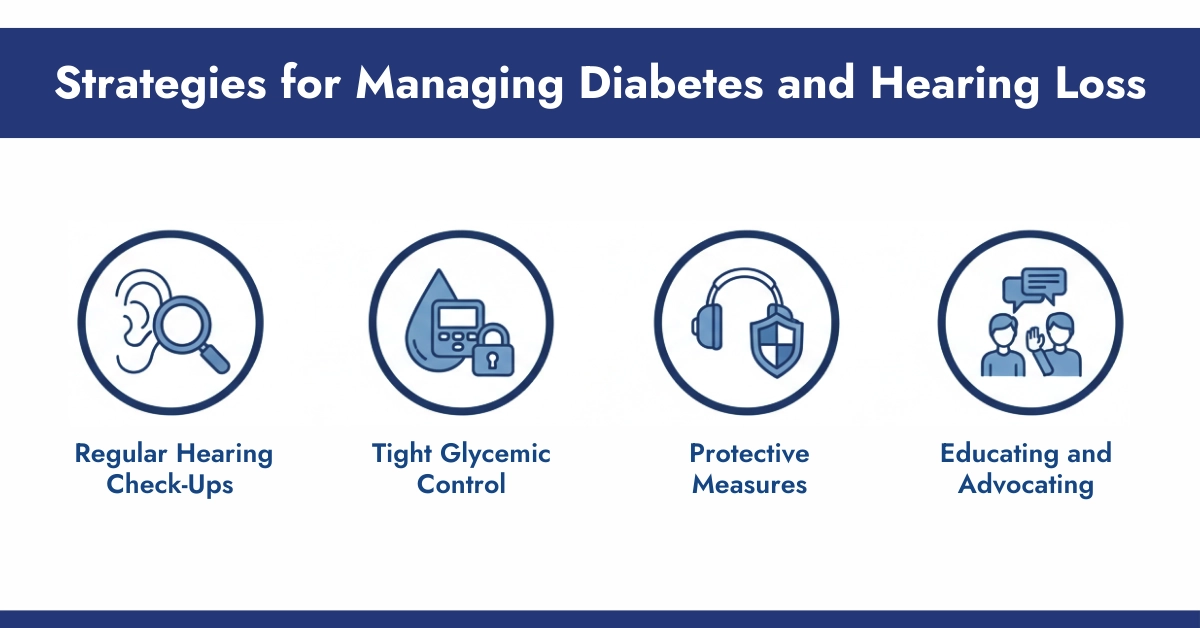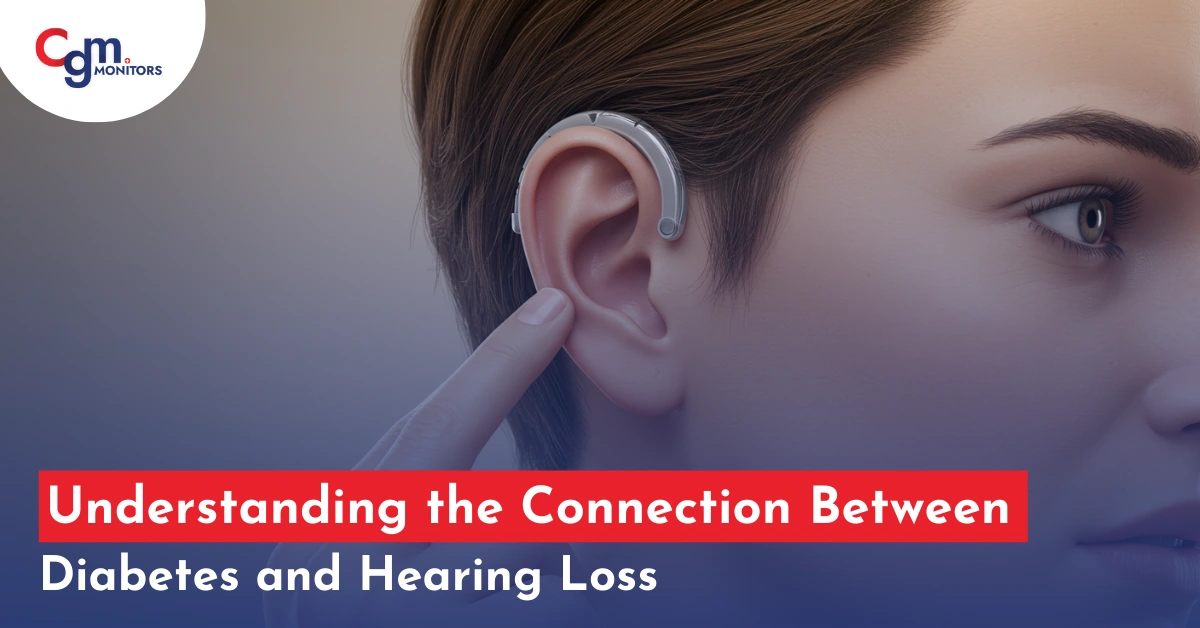Table of content
- The Link Between Diabetes and Hearing Loss
- Ringing in the Ears: Diabetes and Tinnitus
- Pre-Diabetes and Tinnitus: Early Warning Signs
- Diabetes and Ear Infections: Another Overlooked Risk
- Ozempic and Hearing Loss: Is There a Connection?
- Strategies for Managing Diabetes and Hearing Loss
- Conclusion
- Frequently Asked Questions
Diabetes is widely known for its impact on blood sugar levels, heart health, vision, and nerve function. However, one complication that often goes unnoticed is hearing loss. Many people living with diabetes report hearing issues, ringing in the ears, or difficulty understanding speech—often without realizing that their blood sugar levels may be playing a role.
More than 38 million people in the United States are living with diabetes, and research shows that hearing health is often affected. In fact, people with diabetes are twice as likely to experience hearing loss compared to those without the condition. The risk isn’t limited to diabetes alone. Nearly 98 million U.S. adults have prediabetes, and studies reveal that hearing loss is about 30% more common in this group than in people with normal blood sugar levels.
These findings highlight an important but often overlooked reality: changes in blood sugar can have a direct impact on hearing health, even before diabetes is officially diagnosed.
Recent research of American diabetes association has shed light on how diabetes can affect auditory health, leading to increased awareness and better management of this underappreciated aspect of diabetes care. This article explains how diabetes affects hearing, why symptoms like tinnitus occur, and what you can do to protect your ear health.
The Link Between Diabetes and Hearing Loss
Even individuals with pre-diabetes show early signs of auditory damage, highlighting how sensitive the ear is to blood sugar changes. The inner ear depends on tiny blood vessels and delicate nerves to transmit sound signals to the brain. High blood sugar levels can damage these structures over time, similar to how diabetes affects the eyes (retinopathy) and nerves (neuropathy).
Yes, your eyes sight are also affected in diabetes, and this disease causes retinopathy. The Diabetic Community of CGM Monitors always share their thoughts and concerns with us, and we always recommend this blog to understand the connection between diabetes and eye health. CGM Monitors, a trusted supplier of USA, does not give you high-quality CGM sensors but always cares about your diabetic concerns.
Let’s move toward out ropic to understand the connection between diabetes and hearing loss.
Can Diabetes Cause Hearing Loss?
Yes, diabetes can cause hearing loss if you do not take it seriously. Chronically elevated blood sugar may:
- Damage small blood vessels in the inner ear
- Impair auditory nerve function
- Reduce oxygen supply to hearing structures
- Increase inflammation and oxidative stress
This damage often leads to sensorineural hearing loss, which is usually permanent if not addressed early.
It is often observed that many diabetic patients do not properly manage their condition. This includes not using CGM sensors regularly and not taking insulin as prescribed. As a result, they face a higher risk of developing multiple health complications.
CGM Monitors advises patients to consistently monitor and maintain their blood sugar levels using New Dexcom G7, as it offers a 15-day wear time and is designed to be cost-effective and suitable for different budgets, making long-term diabetes management more practical and reliable.
Ringing in the Ears: Diabetes and Tinnitus
One of the most common distressing symptoms linked to diabetes is tinnitus, commonly described as ringing, buzzing, or humming in the ears. In easy terms, when blood sugar levels stay too high or fluctuate a lot, they can affect the nerves and blood flow in the ears. The inner ear is very sensitive, and poor circulation or nerve damage caused by diabetes can lead to this ringing sound—often called tinnitus.
Some people notice the ringing:
- When their blood sugar is out of control
- During sudden sugar spikes or drops
- Along with other symptoms like dizziness or hearing difficulty
It’s your body’s way of signaling that blood sugar management and ear health need attention. Keeping blood sugar levels stable, staying hydrated, and consulting a healthcare provider can help reduce or manage this symptom.
Tinnitus and Blood Sugar: What’s the Connection?
Unstable glucose levels can:
- Increase nerve sensitivity
- Reduce blood flow to the inner ear
- Worsen existing tinnitus symptoms
This explains why some people notice ringing in the ears when blood sugar spikes or drops.
Pre-Diabetes and Tinnitus: Early Warning Signs
Even before a diabetes diagnosis, people with insulin resistance may experience:
- Mild hearing issues
- Intermittent ringing in the ears
- Sound sensitivity
Pre-diabetes tinnitus can act as an early signal that metabolic health is affecting the auditory system. This makes early blood sugar control critical.
Diabetes and Ear Infections: Another Overlooked Risk
People with diabetes are more prone to ear infections due to:
- Weakened immune response
- Slower healing
- Higher infection risk in warm, moist environments
Untreated infections can worsen hearing loss and, in rare cases, lead to serious deafness complications. Persistent ear pain, discharge, or sudden hearing changes should never be ignored.
Ozempic and Hearing Loss: Is There a Connection?
Currently, there is no strong clinical evidence directly linking Ozempic to hearing loss. However, rapid blood sugar changes, dehydration, or electrolyte imbalance may temporarily affect ear function in sensitive individuals. If hearing symptoms appear after starting a new medication, it’s important to consult a healthcare provider rather than stopping treatment abruptly.
It will be interesting for you to know the potential benefits of Ozempic for type 1.5 diabetes. In this article that is written by the experts, you will understand the LADA and Ozempic working principles, along with important safety considerations.
Strategies for Managing Diabetes and Hearing Loss
Regular Hearing Check-Ups
Routine hearing evaluations are crucial for individuals with diabetes. Early detection of diabetes and hearing loss can lead to timely intervention, which can help mitigate the impact of hearing impairment. Audiologists can assess hearing levels and recommend appropriate treatments or interventions, such as hearing aids or auditory rehabilitation. On the other hand endocrninologist may recommend you Dexcom New G7 Sensor for proper diabetes management along with Tandem tslimm x2 (Control-IQ) insulin pump.
Tight Glycemic Control
Maintaining stable blood glucose levels is essential for minimizing the risk of complications, including hearing loss. For this, you need CGM Devices that monitor blood glucose levels continuously. You can get these CGM Devices at CGM Monitors at reasonable prices with insurance features. Following a balanced diet, adhering to prescribed medications, and monitoring blood sugar levels regularly can help manage diabetes effectively and potentially reduce the risk of hearing issues.
Protective Measures
For those with diabetes, protecting hearing health extends beyond medical management. Avoiding exposure to loud noises, using ear protection in noisy environments, and practicing good ear hygiene can help prevent additional hearing damage.
Educating and Advocating
Awareness is key. Educating patients about the risk of diabetes and hearing loss and encouraging them to discuss hearing health with their healthcare providers can lead to better outcomes. Advocacy for integrated care models that address both diabetes management and hearing health is also important for improving overall patient care.
Can diabetes hearing loss be reversed? In most cases, hearing loss caused by nerve or blood vessel damage is not fully reversible. However, progression can often be slowed or managed by: Maintaining stable blood sugar levels, blood pressure and cholesterol, treating tinnitus symptoms early, using hearing aids or sound therapy when needed and most important early detection significantly improves outcomes.

Conclusion
The relationship between diabetes and hearing loss is real, common, and often overlooked. Hearing issues, tinnitus, and ear infections are not just random symptoms—they can be signs that blood sugar levels are affecting nerve and vascular health. By understanding the connection between hearing loss and diabetes, individuals can take proactive steps to protect both their metabolic and auditory health.
Managing diabetes isn’t just about numbers—it’s about preserving every aspect of your well-being, including your ability to hear, communicate, and stay connected to the world.
Frequently Asked Questions
How does high blood sugar affect the ears?
High blood sugar damages tiny blood vessels and nerves in the inner ear over time. This reduces blood flow and disrupts sound signal transmission, leading to gradual hearing difficulties.
How can I prevent hearing loss if I have diabetes?
Keep blood sugar levels tightly controlled, manage blood pressure and cholesterol, avoid loud noises, quit smoking, and get annual hearing checks to catch issues early.
How often should diabetics get their hearing checked?
Get a full hearing evaluation every year, just like eye or foot exams, to monitor for diabetes-related changes.
What is the connection between diabetes and hearing loss?
Diabetes doubles the risk of hearing loss by damaging small blood vessels and nerves in the ears through prolonged high blood sugar. Even prediabetes raises the risk by about 30%.
Can diabetes cause hearing problems?
Yes, diabetes can cause hearing problems by harming inner ear blood vessels and nerves, making it harder to process sounds clearly over time.
What types of hearing loss are associated with diabetes?
Diabetes mainly causes sensorineural hearing loss, affecting the inner ear and auditory nerve, often bilateral, mild to moderate, and sometimes starting with trouble hearing high frequencies or words clearly.
What lifestyle changes can reduce the risk of diabetes-related hearing loss?
Control blood sugar through diet and medication, exercise regularly, eat heart-healthy foods, limit alcohol, avoid smoking, protect ears from loud sounds, and maintain overall vascular health.
Why is diabetic neuropathy linked to hearing issues?
Diabetic neuropathy damages nerves throughout the body, including the auditory nerve that carries sound signals from the ear to the brain, slowing or blocking them and causing hearing loss.
Why is early detection of hearing loss important for diabetics?
Early detection allows quick intervention to slow progression, preserve remaining hearing, improve communication, and reduce risks like isolation, depression, or falls from poor awareness.
When should someone with diabetes seek medical advice for hearing changes?
Seek advice right away if noticing muffled sounds, trouble following conversations, frequent need to ask for repeats, ringing in ears, or any sudden change in hearing.
Who is at higher risk for diabetes-related hearing loss?
Those with long-standing or poorly controlled diabetes, plus additional risks like smoking, high blood pressure, heart disease, peripheral neuropathy, older age, or exposure to loud noise.
Which age group is most affected by diabetes and hearing loss?
Adults over 50–60 years face the highest impact, as aging combines with diabetes damage to accelerate sensorineural hearing loss in both ears.







Write a comment
Your email address will not be published. All fields are required